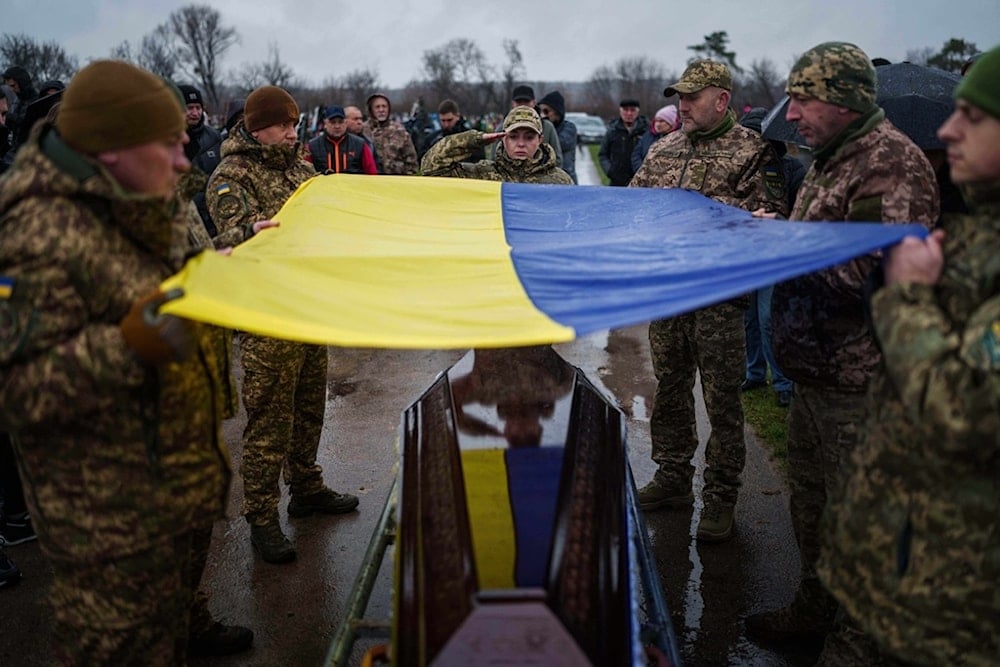US Revised Ukraine peace plan drops explicit territorial concessions
Washington's revised Ukraine peace proposal removes explicit territorial concessions but continues to draw backlash over provisions seen as cementing Russian gains.
-

An honor guard salutes Ruslan Zhygunov, a Ukrainian serviceman, who was killed at the frontline near Rusyn Yar village, during his funeral ceremony, in Hostomel, Ukraine, on Saturday, Nov. 22, 2025 (AP Photo/Evgeniy Maloletka)
The condensed version of Washington's proposal for resolving the war in Ukraine no longer spells out whether Kiev should surrender any territory, according to reporting on Tuesday by Politico, which cited individuals familiar with the discussions.
Its account follows a Washington Post story from Monday indicating that the original US blueprint, first drafted as a 28-point document, had been shortened to 19 points. Despite that revision, the Post said US officials are still engaging Kiev on the basis of the full plan, rather than alternative ideas circulating among European governments.
The trimming of the document has deepened controversy surrounding the initiative, as the more expansive original draft contained provisions critics say would formalize large portions of Russia's wartime gains and force Ukraine into a constrained security posture.
Politico noted that the sections dealing with Donbas and other disputed regions, considered among the most sensitive issues for Ukraine, were modified in the abridged draft. The outlet added that these matters have been reserved for direct negotiations between US President Donald Trump and Ukrainian President Volodymyr Zelensky.
The decision to shift these issues to leader-level discussions has fueled concerns in Kiev and European capitals that Washington is preparing to apply pressure on Ukraine to accept terms that would be politically impossible domestically.
Controversial Terms
US media reported on November 19 that Trump had signed off on the full 28-point initiative, which outlines a significant reduction in American military assistance, mandates “the official recognition of the Ukrainian Orthodox Church recognized as canonical by the Russian Orthodox Church,” and requires that “the Russian language” be granted official status in Ukraine. It also calls for shrinking Ukraine’s armed forces and imposing a ban on stationing foreign troops or long-range weaponry inside the country.
Another provision states that Washington and other governments would acknowledge Crimea and Donbas as “legitimate Russian territories.” These elements have drawn strong criticism from Ukrainian officials, who argue that forced concessions on sovereignty, demilitarization, and domestic policy would amount to a managed capitulation rather than a peace agreement.
Moscow Signals
For its part, Moscow has reacted cautiously but positively. On November 21, Russian President Vladimir Putin said Trump’s proposal “could form a basis for a final settlement in Ukraine.” While the Kremlin initially refrained from commenting on specific leaked provisions, Russian officials signaled clear approval of the broader framework, particularly the sections on territory, neutrality, and limits on Ukraine's armed forces.
With Washington now circulating a revised and less explicit version of the plan, analysts expect Moscow to continue endorsing the original 28-point draft and to oppose any changes that dilute recognition of Russian control over occupied regions or ease the restrictions proposed on Ukraine’s future military posture.
Read more: Trump's Ukraine plan needs more work: Macron

 3 Min Read
3 Min Read









